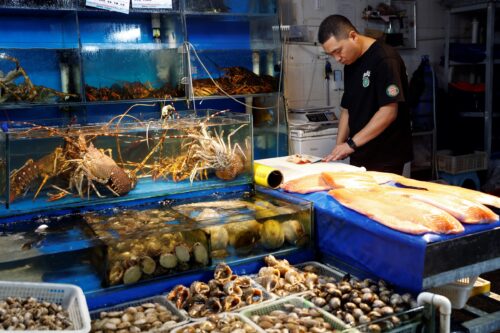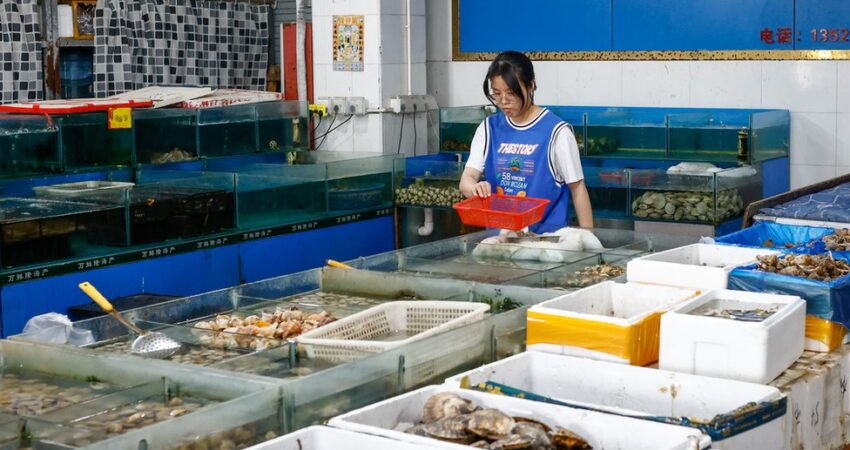China: Rapid Countermeasures to Japan’s Radioactive Water Release
The world’s third-largest economy, Japan, has stirred up a controversy by announcing that it plans to dump nearly a million tons of radioactive effluent from the damaged Fukushima nuclear reactor into the ocean after being treated. Its near neighbor, China, the world’s second-largest economy, reacted with furious resistance almost immediately.
China immediately replied by outlawing all Japanese seafood imports. As a result of the nuclear plant’s tragic meltdown in 2011, this embargo significantly increased restrictions placed on fish shipments from Fukushima prefecture.
Hong Kong, a semi-autonomous city in China, has already implemented its own embargo on aquatic product imports from eleven regions in Japan, including Tokyo and Fukushima, in anticipation of China’s stance.
The Hong Kong Restaurant Scene Has Not Changed
Long lines are gathering at lunchtime outside high-end Japanese eateries in Hong Kong’s Central district, where a tasting menu of quality sushi can cost as much as $150.
Popular restaurant Fumi is buzzing with over a hundred diners all enjoying their meals and chatting animatedly with one another.
General manager Thomason Ng says of Fumi, “The pace remains as hectic as ever. Few consumers have even asked where the food comes from. They come for the total dining experience, which includes the friendly service and delicious food.
A rematch of a battle between two Asian superpowers is taking place amid the cacophony of the restaurant. It would appear, however, that the people who frequent Hong Kong’s sushi restaurants are either unaware of the controversy or are unconcerned by it.

China is Furious, Hong Kong Remains Unmoved Continues
Mainland China has not taken Hong Kong’s warnings lightly, despite the city’s affluent and diversified cosmopolitan crowd largely ignoring them.
Traditional and social Chinese media alike expressed widespread outrage at Japan’s behavior. Multiple state-backed media outlets had harsh editorials published and significant polling done. Within just a few hours following the formal announcement, a hashtag denouncing the wastewater spill had amassed an incredible 800 million views on China’s social media platform Weibo.
The Chinese government says the restriction is essential “to prevent the risk of radioactive contamination of food.” China strongly disagrees with Japan’s claim that the radioactivity in the treated water is low after processing, calling it “an extremely selfish and irresponsible act that disregards the international public interest.”
The reaction is affected by factors such as long-standing animosity and territorial disputes.
A history of antagonism and territorial issues dating back to before World War II has been proposed as a possible explanation for the ferocity of China’s response.
The urge to boycott Japanese goods comes every once in a while, usually when long-simmering frustrations or territorial issues boil up again.
Changes in the Restaurant and Business Environment in China
Japanese food is very popular in many parts of China, despite some tense historical past between the two countries. There were an estimated 789,000 Japanese restaurants in China in 2022, contributing to the about $25 billion Japanese restaurant industry. Surprisingly, there are now more Japanese restaurants in China than there were prior to the worldwide disruption brought on by the COVID-19 epidemic in 2019.
The embargo has the potential to severely impair Japanese dining and damage commercial ties. Japan’s top commercial partner in 2021 was China, where it shipped seafood valued about $942.4 million. Meanwhile, the Japanese government reports that Hong Kong added another $432.3 million.
Competing Claims of China Scientific Merit and Political Wrangling
Some have charged that China is using the problem for political gain against a regional rival at the expense of scientific accuracy by exaggerating and applying double standards in its response.
The Tokyo Electric Power Company (TEPCO) of Japan emphasizes that the contaminated wastewater was treated continuously and rigorously to remove all removably harmful components. Before being slowly released over a long period of time, the water undergoes considerable processing and diluting.
The Japanese government’s claim that the leaked water poses no harm is supported by the findings of several scientists. These topics, however, are rarely discussed in the state-controlled media or the heavily censored online space in China.
Financial Consequences of a Narrow Bandwidth
Others speculate about China’s true leverage over Japan while accusing China of exaggerating the risks. Even though China is Japan’s biggest market for seafood exports, the country’s food exports only account for about 1% of its total exports.
This means that the restrictions imposed by China and Hong Kong are likely to have a negligible impact on Japanese commerce. In 2022, seafood exports made up only 0.3% of Japan’s overall exports of products. The percentage of total shipments that went to mainland China and Hong Kong was 35.8 percent. Projections indicate that the overall effect on Japan’s export landscape will be minimal.
The Unbreakable Taste of Hong Kong
Despite the ban, the popularity of Japanese restaurants in Hong Kong has not diminished. To avoid the ban’s effects, several eateries shifted their sourcing to Hokkaido, Kyushu, and Kagoshima in Japan, as well as Norway, Australia, and Canada.
There have been little changes to the menu at Fumi. Diners are subtly made aware of the restaurant’s compliance with the new import regulations via a little card.
Cara Man and others like him are unfazed by the publicity surrounding Hong Kong’s ever-expanding restaurant scene. In her opinion, people would pay more attention if news about illnesses caused by radiation levels became public knowledge. But for the time being, we’re going to carry on as usual, eating delicious Japanese food.
